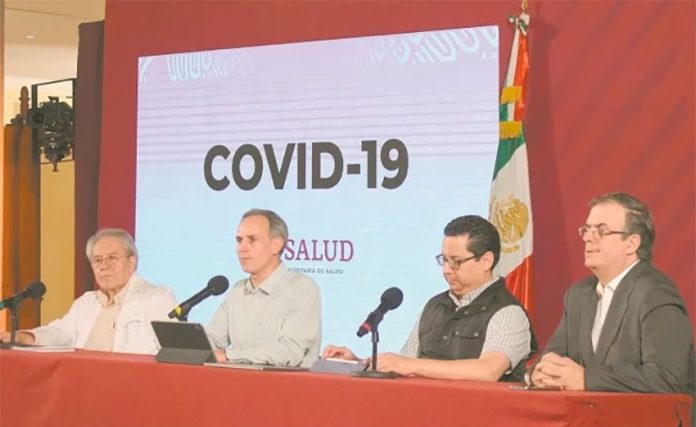As cases of Covid-19 continue to rise steadily, Deputy Health Minister Hugo López-Gatell issued some blunt advice to Mexicans on Saturday: stay at home for the next month.
Flanked by Health Minister Jorge Alcocer and Foreign Affairs Minister Marcelo Ebrard, López-Gatell spoke forcefully at a press conference on Saturday night, telling Mexicans they have a final opportunity to slow the spread of the virus and thus reduce deaths and avoid the health system being overwhelmed.
“We must [all] contribute to reduce the intensity of the pandemic,” he said. “We need to adopt all of the instructed [social distancing] measures.”
Reducing the speed of the transmission of the virus – there were 993 confirmed cases of Covid-19 in the country as of Sunday – is “urgent,” López-Gatell said.
“It’s our last opportunity to do it and we have to do it now. This requires us … to stay at home en masse. That’s why we’re saying directly to society, to each and every one of the members of this republic, stay at home, stay at home, stay at home because … it’s the only way to reduce the transmission of this virus,” the health official said emphatically.
López-Gatell said that there is evidence that less than a third of Mexico City residents have heeded the call to stay at home as much as possible.
“There is traffic monitoring that allows us to gauge if people are at home and we see that they are not,” he said.
“There has been a reduction of less than 30% [in movement around the capital] despite the government directive. We see that the [social distancing] measures are not being applied with the necessary rigor. … Stay at home … If we don’t all stay at home what will happen in coming weeks is that we will have more cases than we can attend to … and that will lead us to unfortunate outcomes.”
The deputy minister, who is leading the government’s coronavirus response, said that authorities are not currently thinking about ordering an obligatory home quarantine or making use of the police to enforce social distancing recommendations. Therefore it is up to the individual to act responsibly, he said.
Presenting graphs detailing how serious coronavirus outbreaks developed in countries such as Italy, Spain and the United States, López-Gatell said that Mexico must do all it can to avoid reaching a similar situation.
“It’s something that we don’t want to experience – not the government or society because it’s something uncontrollable. That’s why we’re emphasizing this moment of opportunity” to act, he said.
“We haven’t passed 1,000 cases, we still have the opportunity to slow down” the spread of Covid-19, López-Gatell declared.
“Let it be clear that this doesn’t mean that an increase in cases will be avoided; they will keep going up and there will be serious ones and deaths. What we can achieve is slow down the speed of infections so that the hospitals have enough beds when we reach the highest transmission phase,” he said.
On Sunday, health authorities announced 145 new Covid-19 cases, taking the total number of confirmed cases across the country to 993. Among those confirmed to have the disease are Hidalgo Governor Omar Fayad and Tabasco Governor Adán Augusto López.
Authorities also announced that coronavirus-related deaths had increased to 20 from 16 on Saturday.
Ricardo Cortés, general director of health promotion at the Health Ministry, told a press conference Sunday night that there were also 2,564 suspected cases of Covid-19 and that 4,955 people had tested negative for the disease.
Of the 993 confirmed cases, 132 are considered community transmission cases while the remainder are linked to overseas travel or direct contact with someone who recently returned to Mexico from abroad. Mexico City has the highest number of coronavirus cases followed by México state, Jalisco, Nuevo León and Puebla.
Cortés said that 86% of the people confirmed to have Covid-19 have not required hospitalization while the other 14% have. Of the latter cohort, 65% are in stable condition, 30% are in serious condition and 5% are on ventilators, he said.
The official said that the ages of those confirmed to have coronavirus range from 0 to 88.
“Although the most serious cases are in people older than 65, we can all get sick. That’s why we should all stay at home; young people can also get serious cases [of Covid-19]; they’re not immune even if they don’t have any comorbidity,” Cortés said.
“When you ask yourself should I go out or not, remember that the virus is waiting for you outside. If you’re young, nothing might happen to you but don’t forget that when you return to your homes, you could transmit the virus to others.”
Cortés said that 90% of the 20 coronavirus-related deaths – 18 in total – have been of men while two women have died.
There have been two deaths in the 35-39 age bracket; four in the 40-44 bracket; one in the 45-49 bracket; five in the 55-59 bracket; three in the 60-64 bracket; and five among Covid-19 patients aged 65 or older.
Cortés said that 50% of those who have died suffered from obesity, 50% had hypertension, 45% had diabetes, 15% had chronic kidney problems and 15% had chronic obstructive pulmonary disease.
Source: El Universal (sp), Milenio (sp)
